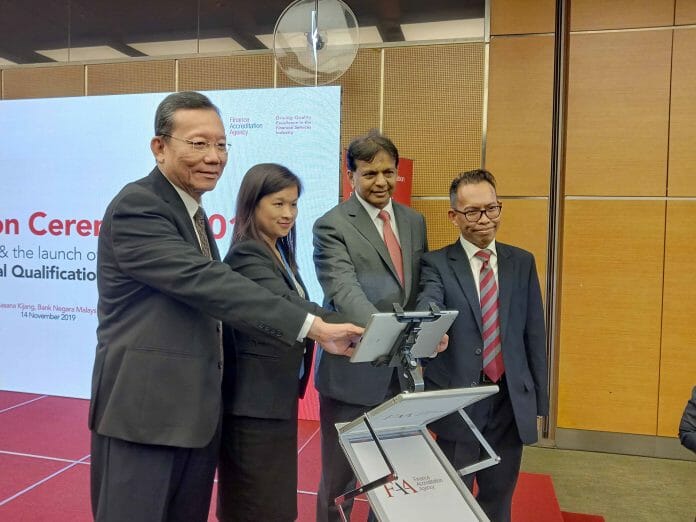The Finance Accreditation Agency (FAA), an international independent quality assurance and accreditation body for the Financial Services Industry (FSI), launched its Finance Professional Qualifications Structure (FPQS) at the Sasana Kijang in Kuala Lumpur recently.
The FPQS aims to enable the mapping of finance professional qualifications into a single qualifications structure, provide the mechanism to classify learning levels of professional qualifications in the financial services industry and assist any employee in the financial services industry to map their learning and plan their knowledge progression according to their chosen career path. It’s made up of 4 sectors – Banking, Capital Market, Insurance, Financial Planning and Wealth Management.
Khairul Nizam, the Chief Executive Officer, FAA says: “The FPQS was developed through group efforts with a panel of industry experts and practitioners from different financial services sectors to develop and structure the content of the document. This structure is based on International best practices and are also internationally benchmarked. The FPQS will be a point of reference for the development of conventional finance professional qualification programmes for sectors of banking, capital market, insurance and financial planning and wealth management.”
“The FPQS follows the successful development of the Islamic Finance Professional Qualification Structure (IFPQS) which was completed in 2017. Together we have developed a complete comprehensive set of references for the FSI,” adds Khairul.
FPQS will benefit many stakeholders in the FSI in their efforts to design, develop and deliver globally recognised programmes for the industry. Although designed for professional programmes, the FPQS complements universities/institutions to ensure that intended learning objectives and outcomes are met and that graduates are ready to serve the FSI industry upon graduation.
“With FPQS, talents will be able to make informed decisions and easily identify suitable professional learning programmes that meets their knowledge and sector progression,” he explains further.
The FPQS was launched together with the Certification ceremony, FAA’s annual event, which saw institutions and individuals receiving their awards for the FAA Programme Accreditation (FPA) Certificate, FAA Individual Accreditation (FDA) Certificate and the Certified Training Professional (CTP) Certificate.
Incorporated in 2012, FAA is supported by Bank Negara Malaysia and the Securities Commission Malaysia; to raise the standards of the Financial Services Industry (FSI) through well-developed framework, criteria, reference structures and processes which aims to contribute towards promoting the highest standards in the development of talent for the FSI. FAA is responsible for programme accreditation, individual accreditation and programme review of learning initiatives within the FSI.
Since incorporation, FAA has carried out more than 100 learning programme accreditations and capacity-building projects with financial institutions, finance industry training providers, finance industry associations, and institutions of higher learning.
“Today, FAAs accreditation is globally recognised and we currently su:pport international markets in Europe, Middle East, South Asia, Central Asia, Southeast Asia and Africa. Today we are proud to announce the launch of the Finance Professional Qualification Structure (FPQS),” says Khairul.
“The quality development of talent is essential for the growth of the industry. Our guidelines and accreditation help the industry map out a strategy for human capital development and learning pathways that should be offered to professionals in the industry. With the FPQS, we are able to collectively raise the standards for the FSI.”
The FAA is part of a number of international networks on accreditations and quality assurance including the International Education Association for Higher Education, Asia-Pacific Quality Assurance Network, ASEAN Quality Assurance Network, Council for Higher Education Accreditation and more.









